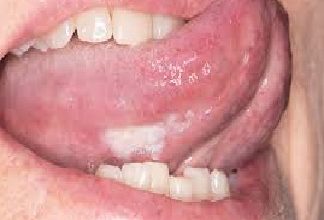Oral cancer
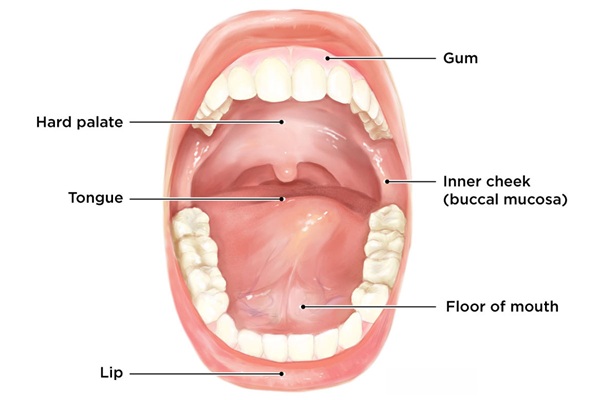
Oral cancer, also known as mouth cancer or cancer of the oral cavity, is a type of cancer that begins in the mouth, lips, or throat. The most common type is squamous cell carcinoma, which develops in the flat cells lining the oral cavity. Other types include verrucous carcinoma, lymphoma, mucosal melanoma, and sarcoma.
Mouth cancer is a growth of cells that starts in the mouth. Mouth cancer can happen in any of the parts that make up the mouth.
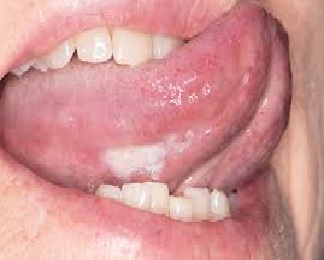
Mouth cancer can occur on the
Lips.
Gums.
Tongue.
Inner lining of the cheeks.
Roof of the mouth.
Floor of the mouth.
The mouth also is called the oral cavity. Cancer that happens in the mouth is sometimes called oral cancer or oral cavity cancer.
Mouth cancer is one of several cancers that are considered to be types of head and neck cancer. Mouth cancer and other head and neck cancers often have similar treatments.
Symptoms of Oral cancer
It’s not always clear what causes mouth cancer. This cancer starts as a growth of cells in the mouth. It most often starts in cells called squamous cells. These are flat, thin cells that line the lips and the inside of the mouth. Most oral cancers are squamous cell carcinomas.
Mouth cancer happens when cells on the lips or in the mouth develop changes in their DNA. A cell’s DNA holds the instructions that tell the cell what to do. In healthy cells, the DNA tells the cells to grow and multiply at a set rate. The DNA also tells the cells to die at a set time.
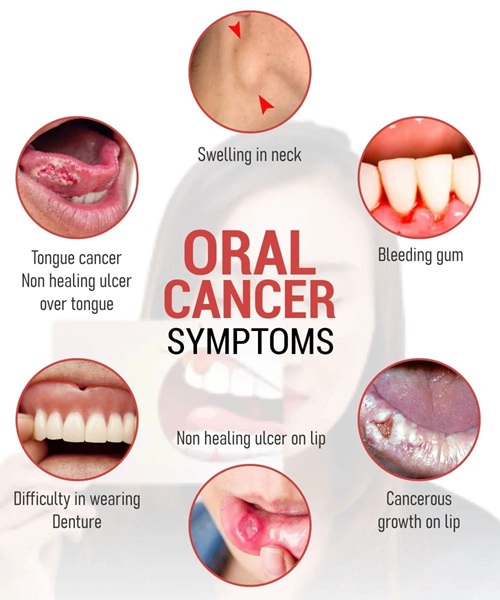
In cancer cells, the DNA changes give different instructions. The changes tell the cancer cells to grow and multiply quickly. Cancer cells can keep living when healthy cells would die. This causes too many cells.
The cancer cells might form a mass called a tumor. The tumor can grow to invade and destroy healthy body tissue. In time, the cancer cells can break away and spread to other parts of the body. When cancer spreads, it’s called metastatic cancer.
Persistent mouth sores or ulcers that don’t heal.
Red or white patches in the mouth.
A lump or thickening on the cheek.
Difficulty chewing or swallowing.
Persistent sore throat, hoarseness, or ear pain.
Changes in voice or speech.
Areas in the mouth that bleed for no obvious reason.
Numbness, pain, or tenderness on the face, neck, or in the mouth.
Unintentional weight loss.
Chronic bad breath.
Causes of Oral cancer
Smoking and tobacco use
The main cause of oral cancer, especially squamous cell carcinoma. All forms of tobacco increase the risk of mouth cancer. This includes cigarettes, cigars, pipes, chewing tobacco and snuff.
Alcohol consumption
Increases the risk, particularly when combined with smoking. Frequent and heavy drinking increases the risk of mouth cancer. Using alcohol and tobacco together increases the risk even more.
Human papillomavirus (HPV) infection
HPV-16 is strongly associated with oral cancer, especially oropharyngeal cancers. Human papillomavirus, also called HPV, is a common virus that’s passed through sexual contact. For most people, it causes no problems and goes away on its own. For others, it causes changes in the cells that can lead to many types of cancer, including mouth cancer.
Sun exposure
Increases the risk of lip cancer. Ultraviolet light from the sun and tanning lamps increases the risk of lip cancer.
Poor diet
Lack of fruits and vegetables can increase the risk.
Poor oral hygiene
Increases the risk.
Long-term rubbing
From rough teeth, dentures, or fillings.
Weakened immune system
Due to medications or other conditions. If the body’s germ-fighting immune system is weakened by medicines or illness, there might be a higher risk of mouth cancer. People with a weakened immune system include those taking medicines to control the immune system, such as after an organ transplant. Certain medical conditions, such as infection with HIV, also can weaken the immune system.
Family history
Having a family member with oral cancer can increase risk.
Diagnosis of Oral cancer
Physical Examination of Oral cancer
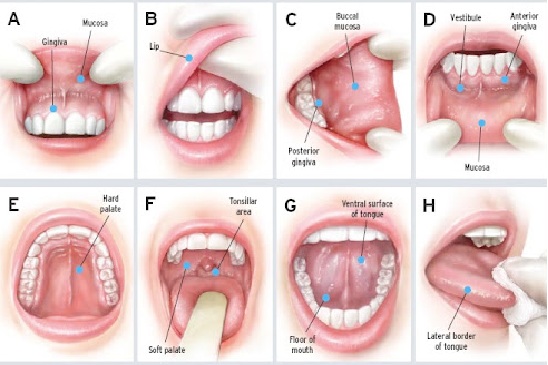
In a physical exam for mouth cancer, a healthcare professional looks at and feels your lips and mouth. That person checks for any lumps and areas of irritation. White patches in the mouth, called leukoplakia, and sores may be early signs of cancer.
Mouth cancer biopsy
If something concerning is found in an exam, the next step might be a mouth cancer biopsy. A biopsy is a procedure to remove a sample of tissue for testing in a lab. For a mouth cancer biopsy, a healthcare professional may use a cutting tool to cut away some concerning tissue from the mouth.
In the lab, tests can check the tissue for signs of cancer. Other tests might look for changes in the DNA inside the cancer cells. Results from these tests may help your healthcare team make a treatment plan.
Mouth cancer staging
Your healthcare team may do other tests to see if the cancer has spread beyond the mouth. Your healthcare team may use the results of these tests to give your cancer a stage. The stage tells your healthcare team about the extent of the cancer and about the prognosis. It also helps guide the treatment plan.
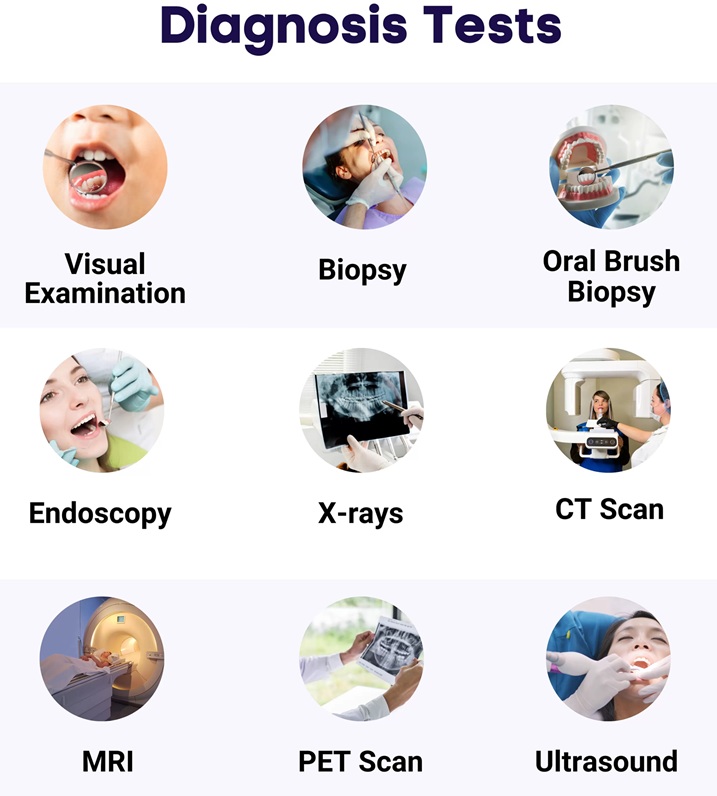
Mouth cancer staging tests may include
Using a small camera to look at the throat. During a procedure called endoscopy, a healthcare professional passes a thin, flexible tube equipped with a camera down the throat. The procedure helps the health professional look for signs that cancer has spread beyond the mouth.
Imaging tests.
A variety of imaging tests may help check whether cancer has spread beyond the mouth. Imaging tests may include X-ray, CT, MRI and positron emission tomography scans, also called PET scans. Not everyone needs each test. Your healthcare team decides which tests are needed based on your condition.
Mouth cancer stages range from 0 to 4. The lowest stages mean the cancer is small and hasn’t grown very deep into the tissue in the mouth. As the cancer grows larger and grows deeper into the tissue, the stages get higher. A stage 4 mouth cancer can mean the cancer has grown very large or has spread to the lymph nodes. Stage 4 mouth cancer also can mean the cancer has spread to other parts of the body.
Treatment of Oral cancer
Treatments for mouth cancer include surgery, radiation therapy and medicines. Medicines that help treat mouth cancer include chemotherapy, targeted therapy and immunotherapy. You may have just one type of treatment, or you may undergo a combination of cancer treatments.
Many factors when creating a mouth cancer treatment plan. These may include the cancer’s location and how fast it’s growing even whether the cancer has spread to other parts of the body and the results of tests on the cancer cells. Also consider your overall health and personal preferences.
Surgery
To remove the tumor
During mouth cancer surgery, the surgeon removes the cancer and some of the healthy cells around it, called a margin. Removing the margin helps ensure that all the cancer cells are removed. The extent of the surgery depends on the size of the cancer. If cancer has spread into bone, the surgeon may remove some bone tissue.
Surgery carries a risk of bleeding and infection. Surgery for mouth cancer may affect your appearance. It also may affect the ability to speak, eat and swallow. Physical therapy and other rehabilitation services can help you cope with these changes.
May need a tube to help you eat, drink and take medicine. For short-term use, the tube may be inserted through the nose and into the stomach. Longer term, a tube may be inserted through the skin and into the stomach.
Surgery to reconstruct the mouth in Oral cancer
Reconstructive surgery may be needed when parts of the face, jaw or neck are removed during surgery. Healthy bone or tissue may be taken from other parts of the body and used to fill gaps left by the cancer. This tissue can replace part of the lip, tongue, palate or jaw, face, throat, or skin. Dental implants also may be used to replace your natural teeth.
If reconstruction is used to replace parts of the mouth, it usually is done at the same time as surgery to remove the cancer.
Surgery to remove lymph nodes in the neck
When mouth cancer spreads, it often goes to the lymph nodes in the neck first. If there are signs that the cancer has spread to the lymph nodes, you might need surgery to remove some lymph nodes, called a neck dissection. Even if there are no signs of cancer in the lymph nodes, you may have some of them removed as a precaution. Removing the lymph nodes removes the cancer and helps your healthcare team decide if you need other treatments.
To get to the lymph nodes, the surgeon makes a cut in the neck and removes the lymph nodes through the opening. The lymph nodes are tested for cancer. If cancer is found in the lymph nodes, other treatment might be needed to kill any cancer cells that are left. Options might include radiation or radiation combined with chemotherapy.
Sometimes the surgeon will remove only a few lymph nodes for testing. This is called a sentinel lymph node biopsy. In a sentinel lymph node biopsy, the surgeon removes the first few nodes into which a cancer may have spread. The lymph nodes are tested for cancer. If there’s no cancer detected, it’s likely that the cancer hasn’t spread. Sentinel node biopsy isn’t an option for everyone with mouth cancer. It’s only used in some situations.
Radiation therapy for Oral cancer
To kill remaining cancer cells after surgery or as the main treatment for small tumors.
Radiation therapy treats cancer with powerful energy beams. The energy can come from X-rays, protons or other sources. Radiation therapy for mouth cancer is most often delivered by a machine that moves around the body. The machine aims radiation to precise points. This kind of radiation therapy is called external beam radiation.
Sometimes radiation therapy for mouth cancer involves placing radioactive material inside the body. This kind of radiation therapy is called brachytherapy.
Radiation therapy might be the only treatment needed if the mouth cancer is very small. More often, radiation therapy is used after surgery. It can help kill any cancer cells that might remain. Sometimes radiation therapy may be combined with chemotherapy. This combination increases the effectiveness of radiation therapy. It also increases the risk of side effects.
If the cancer grows large or spreads to other parts of the body, radiation therapy may help relieve pain and other symptoms caused by the cancer.
The side effects of radiation therapy to the mouth may include dry mouth, tooth decay and damage to the jawbone.
May need to see a dentist before radiation therapy starts to be sure your teeth are as healthy as possible. Any unhealthy teeth may need treatment or removal. A dentist can also help you understand how best to care for your teeth during and after radiation therapy to reduce your risk of complications.
Chemotherapy for Oral cancer
To kill cancer cells that may have spread to other parts of the body.
Chemotherapy treats cancer with strong medicines. Chemotherapy is often used after surgery to kill any cancer cells that remain. Chemotherapy may increase the effectiveness of radiation therapy, so the two treatments are often combined. If the cancer spreads to other parts of the body, chemotherapy can help control it.
The side effects of chemotherapy depend on which medicines you receive. Common side effects include nausea, vomiting and hair loss. Ask your healthcare team which side effects are likely for the chemotherapy medicines you’ll receive.
Targeted therapy
Newer treatments that target specific cancer cells.
Targeted therapy for cancer is a treatment that uses medicines to attack specific chemicals in the cancer cells. By blocking these chemicals, targeted therapy can cause cancer cells to die.
For mouth cancer, targeted therapy may be used alone or in combination with chemotherapy or radiation therapy. It might be used after surgery to kill any cancer cells that remain. It also can help control a cancer that comes back or that spreads to other parts of the body.
Immunotherapy for oral cancer
A type of therapy that boosts the body’s immune system to fight cancer.
Immunotherapy for cancer is a treatment with medicine that helps the body’s immune system kill cancer cells. The immune system fights off diseases by attacking germs and other cells that shouldn’t be in the body. Cancer cells survive by hiding from the immune system. Immunotherapy helps the immune system cells find and kill the cancer cells.
For mouth cancer, immunotherapy might be used when mouth cancer comes back or spreads to other parts of the body.
Prevention of Oral cancer
Avoid tobacco use to prevent oral cancer
Quit smoking and avoid all tobacco products. If you don’t use tobacco, don’t start. If you currently use tobacco of any kind, talk with your healthcare team about strategies to help you quit.
Limit alcohol consumption
Drink in moderation or avoid alcohol altogether. If you choose to drink alcohol, do so in moderation. For healthy adults, that means up to one drink a day for women and up to two drinks a day for men.
Get vaccinated against HPV
Reduces the risk of HPV-related cancers.
Protect your lips from the sun
Use sunscreen and limit sun exposure. Protect the skin on your lips from the sun by staying in the shade when possible. Wear a broad-brimmed hat that shades your entire face, including your mouth. Apply a sunscreen lip product for sun protection.
Maintain good oral hygiene
Brush and floss regularly, and see a dentist for regular checkups.
Eat a balanced diet
Include plenty of fruits and vegetables.
Managing stress
Take control of stress in your daily life. Try stress-reduction techniques such as muscle relaxation or visualization. Writing in a journal also may help.
Massage therapy
During a massage, a massage therapist applies pressure to your skin and muscles. Some massage therapists are specially trained to work with people who have cancer.
Coping and support
As you talk about your mouth cancer treatment options with your healthcare team, it’s common to feel overwhelmed. People who are newly diagnosed with mouth cancer may be trying to cope with the diagnosis at the same time they need to make decisions about their treatment. Here are some ideas that may help.
Find a good listener
Finding someone who is willing to listen to you talk about your hopes and fears can be helpful as you manage a cancer diagnosis. This could be a friend or family member. A counselor, medical social worker or clergy member also may offer helpful guidance and care.
Talk to other oral cancer survivors
Other people with mouth cancer may understand what you’re going through. Ask your healthcare team about support groups for people with cancer in your community. In the United States, contact your local chapter of the American Cancer Society. Another option is online support groups, such as those run by the Oral Cancer Foundation.
Take time for yourself
Set aside time for yourself each day. Use this time to take your mind off your cancer and do what makes you happy. Even a short break to relax in the middle of a day full of tests and appointments may help you cope.
medlight2u.com
A light on Practice of Medicine (The information provided is for informational and educational purposes only and should not be considered professional advice)
Acne Acne vulgaris Acute Renal Failure Adrenal cortex Angina Angina Pectoris Aortic Regurgitation (AR) Aortic Stenosis (AS) Chest pain Chronic pyelonephritis Coarctation of Aorta Cough cyanosis Cystic acne Dehydration depression Diabetes Mellitus Diagnosis of Aortic Stenosis Dr.KTS DR K TAMILSELVAN Fatigue Heart Failure Hypertension Hypokalemia Hypothyroidism Ischemic Heart Disease LBBB Mitral Incompetence Mitral insufficiency Mitral valve prolapse Nocturia Patent Ductus Arteriosus PDA Polyuria Proteinuria pulmonary hypertension Pulmonary Stenosis ST Depression Symptoms of Acne Syncope Treatment for acne valvular heart disease Ventricular Septal Defect VSD Zits
